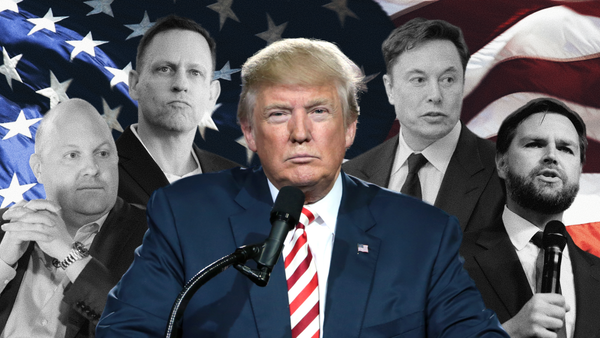Given that The Lord of the Rings is one of the bestselling book series of all time, it shouldn’t come as a surprise that it’s inspired a lot of different groups and movements over the decades, with a wide range of politics. Probably the most influential is Silicon Valley, where the top of Salesforce Tower in San Francisco lights up with the Eye of Sauron on Halloween, executives reference its lore to get their vision across to employees, and companies name meeting rooms — if not their whole business — after objects and people from the books.
After J.D. Vance’s selection as Republican vice-presidential candidate briefly put the spotlight on his relationship with Peter Thiel and the Valley’s obsession with Middle-earth, I decided to see how widespread these companies named after aspects of Middle-earth actually are. Unsurprisingly, the dark lord Peter Thiel holds the One Ring to rule them all — or close enough.
Palantir
Probably the most obvious and the most well known, would be Palantir Technologies. The company, founded by Thiel, Nathan Gettings, Joe Lonsdale, Stephen Cohen, and Alex Karp in 2003, is named after a series of dark seeing stones that can be used for long-distance communication and to look across long distances to gather intelligence on happenings through Middle-earth. It’s not hard to see how the name relates to the company.
Palantir sells a series of tools borne of PayPal’s fraud-detection system initially designed to wade through vast quantities of intelligence data, but which has since expanded into policing, health care, and other commercial and government applications. The company’s tools are supposed to provide better visibility into all the data being collected, but there have been consistent questions about how well the tools are at actually doing that and how much the company overstates their capabilities. In Tolkien’s mythology, the palantíri were known for not always being accurate either. They could be used by powerful forces to sway what other users saw, notably corrupting the wizard Saruman and driving the Gondorian steward Denethor to madness.
Anduril
The other company you might have encountered is Anduril Industries. Anduril was founded in 2017 by Palmer Luckey and a series of investors associated with Palantir and SpaceX, and got its initial funding from Thiel’s Founders Fund. It’s not a coincidence that it was created after Donald Trump became president, and it has quickly become an important vendor of defense tech to the US military.
The company is named after a sword whose elvish name translates to Flame of the West. It was forged from the shards of Narsil, the sword of the King of Gondor that was used to cut the One Ring from the hand of Sauron, then wielded by Aragorn as he reclaims the throne left unoccupied by his ancestors for generations. In the black-and-white morality of the series, the sword is a symbol of good; of the triumph of the Free Peoples of Middle-earth against the darkness spreading from Mordor. That might seem to be in conflict with an evil weapons company, but if you’re a right-wing extremist who believes in the story of US greatness, a weapons company provisioning the US military for geopolitical conflict with the non-Western world might fit into such a story quite well. Flame of the West indeed.
Valar
Not all of these firms actually do something tangible; a lot of them are about moving money around and making more for the people in control of them, like Valar Ventures. In Tolkien’s universe, the Valar are holy beings that can take many forms and shaped the world of Arda, in which Middle-earth is one continent, before awakening the elves, humans, and other beings. I’m sure the people in charge of the venture capital fund see themselves as world-shaping beings too.
Valar Ventures was founded in mid-2010 by Thiel, Andrew McCormack, and James Fitzgerald. The timing is important because it was around that time that Thiel was working on getting citizenship in New Zealand, without having to go through the normal process. Not long after, the fund poured $4 million in Xero, a Kiwi accounting software company whose share price was hovering around $1 and was struggling to gain traction. Today it’s one of the largest companies by market cap in New Zealand, thanks to Thiel’s help and investment.
In a series of meetings with New Zealand government officials in 2010, Thiel used that investment as an example of what Valar Ventures — and the millions he could deploy through it — could do for the country’s tech industry. He would become an ambassador and set up an incubator in Auckland, if only the government granted him a passport. But once he got it in 2011, despite having only spent 12 of the usual 1350 required days in the country, little that he promised actually materialized.
Valar partnered with the government-owned New Zealand Venture Investment Fund on a fund to invest in local tech companies, but quickly started looking elsewhere. Six months after getting his citizenship, Valar’s original mission statement saying it was “founded to help grow New Zealand into a hub of technological progress” dropped any reference to the country and invested in just one Kiwi company after 2011. In 2017, Thiel activated a clause that allowed him to buy out the government and keep the lion’s share of the profits for himself.
Narya
Narya Capital isn’t just a vehicle for financial influence, but also for Thiel to cultivate another acolyte to send into the world. The firm was co-founded by J.D. Vance in 2020, with $100 million from Thiel and his network to get it started. Thiel also funded Vance’s 2022 Senate campaign to the tune of $15 million. Now that’s paying off with the potential for Thiel to have a lot of influence in a future Trump administration, if he wins in November.
In The Lord of the Rings, Narya is one of the three elven rings linked to Sauron’s One Ring. Also known as the Ring of Fire, it’s supposed to inspire hope and allow the bearer to resist the weariness of time. But, like all the rings of power, when Sauron has the One Ring he can influence the person wearing Narya — not unlike the influence Thiel wields over Vance.
Mithril, Rivendell, and Lembas
I’m going to wind up these last few financial companies under the same heading. Mithril is a rare silvery metal primarily mined by the dwarves in Moria that’s known for being very strong and lightweight, but in the real world it’s another venture firm co-founded by Thiel in 2012. Managing General Partner Ajay Royan said the metal is supposed to “protect” and be “transformative,” which was also the goal of the fund. Mithril Capital Management is where Vance first entered Thiel’s employment in 2016, though he apparently didn’t show up much, and the company became such a mess the FBI had to investigate it.
Rivendell One and Lembas Capital acted more like holding companies for Thiel’s shares in Facebook, where he was the first outside investor. Rivendell is a hidden elven city, seemingly also a good name for an entity to hide money, while lembas is an elven waybread known to fill a grown man’s stomach with one bite. I’m sure the money Thiel made off Facebook was enough to fill many stomachs many times over. A ProPublica investigation in 2021 also made reference to a Rivendell Trust where Thiel held his Roth IRA, allowing the fortune hidden within it to increase in value tax-free.
Lembas has been used for a series of seemingly defunct food and blockchain startups, while Mithril is also the name of a blockchain protocol stylized as MITH.
Athelas
Athelas, or kingsfoil, is a weed in Middle-earth that has healing properites. Aragorn uses it when Frodo is stabbed by a Ringwraith on Weathertop, then again to heal the wounded after the battle of the Pelennor Fields. In the tech world, Athelas is a software platform to help healthcare businesses manage their revenues — and, of course, it has AI! The link to Thiel is a bit more tenuous here: Garry Tan, an early employee at Palantir and current CEO of Y Combinator is among the key investors.
Iluvatar
Before Middle-earth or event the Valar existed, there was Eru Ilúvatar, the deity who created other angelic beings and ultimately the world of Arda itself, in which Middle-earth is one continent. Meanwhile, Iluvatar CoreX is a semiconductor company based in Nanjing founded in 2015 by experts from Silicon Valley and China. I think this might finally be one Thiel has no connection to.
Special Mention: Founders Fund
Thiel’s main venture firm Founders Fund clearly doesn’t have a Lord of the Rings-inspired name, but it’s reportedly referred to as “the precious” within his inner circle. That’s Gollum’s nickname for the One Ring.






Member discussion